-
COMING SOON - IO Plus! The Adafruit IO Subscription Plan
IO Plus, The Adafruit IO Subscription Plan
COMING SOON After a long time in beta testing mode, IO is getting a subscription plan, IO Plus! It’s been in our minds since we started this project a few years ago and “How can I get more feeds?” has been the most frequent and persistent question from people using and interested in IO, which is GREAT! The good news is that we finally have an answer for you. Say hello to IO+!
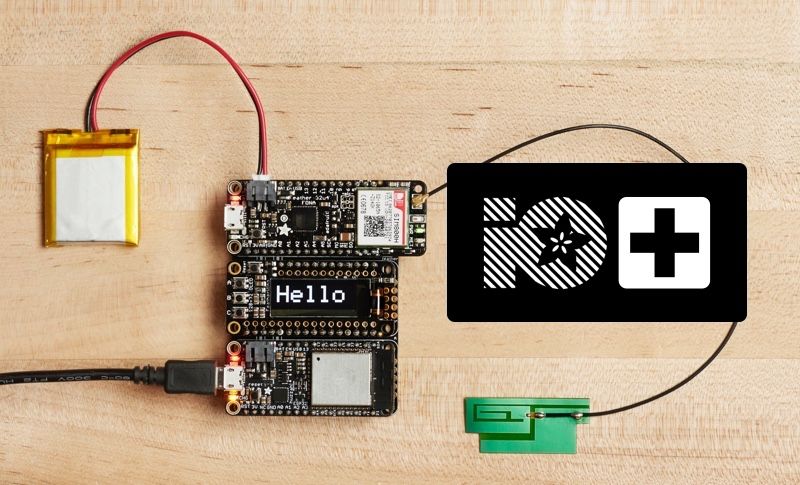
Here is what’s coming (we have not decided on a date yet!):
- For a flat $10 per month, you can subscribe to IO+ and get unlimited feeds, unlimited dashboards, and two months of data storage.
- We will always continue to provide a free plan, but for new subscribers, the free plan will be limited to 5 feeds and everyone on the free plan will be limited to 30 new data points per minute.
- As a thank you to everyone who’s been with us this far, we’re giving away three months of IO+ free when you subscribe1. You won’t pay anything unless you keep your subscription after the third month. Additionally, if you have more than 5 feeds when we move to the new account limits, you can keep the extras2.
- No more “Beta” ;)
It’s always been our goal with Adafruit IO to make the best designed Internet of Things platform for makers of all ages and skill levels. We want it to work well with the connected devices and kits we sell and we built it with an open API to make sure it can work with any device that can speak HTTP or MQTT. Additionally, as a business, we need a way to make the service self-sustaining financially, without making it inaccessible to the makers we are trying to serve.
IO+ will provide more functionality at a single flat rate to the people who need it while our continuing free plan will let anyone build a project on IO, whether it’s their first time working with the Internet of Things or their hundredth.
We will keep standing up for everything we’ve said before in our Internet of Things Bill of Rights, whether you’re using IO+ or IO Free. Our platform is built on open technologies and you control your clients and devices. You own your data and you will always be able to decide what is public and what is private. We want to keep building a system that is easier to use for good and harder to use maliciously. We hope you’ll join us!
So that’s the big news, IO+ is coming in the beginning of October. If all goes as planned, it will be available Monday, October 2. Please stop by the IO Forum or our Discord chat server to ask questions or communicate with us. We’d love to hear from you.
Other changes
We’ll also be launching some changes to the IO interface to clean up navigation and make sure you know what’s up with your plan. Since those changes will go live with the IO+ launch, here are some screenshots to give you a preview:
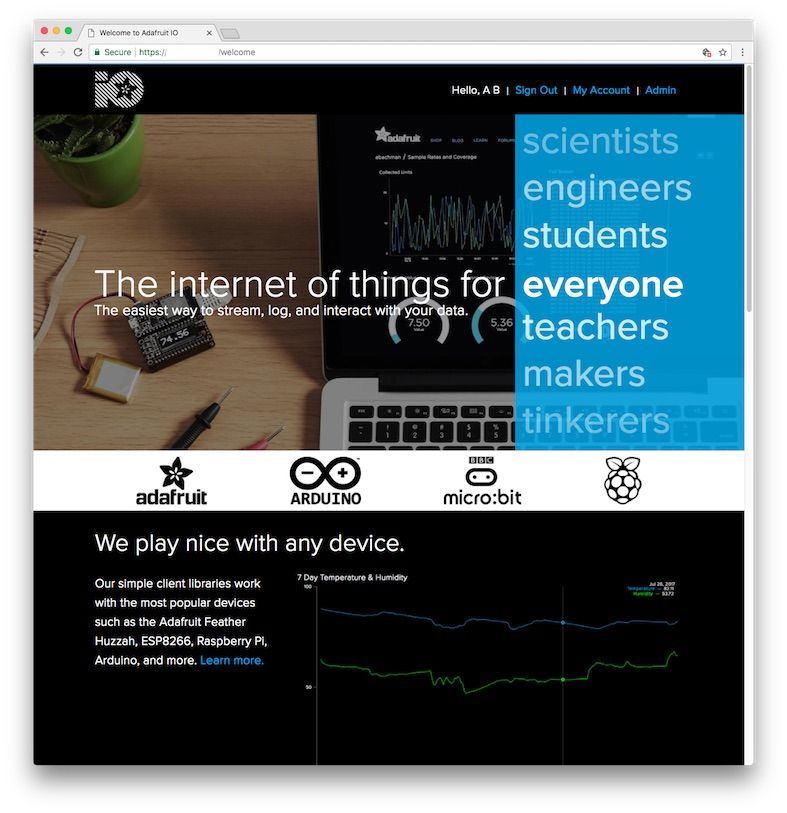
An updated landing page. Way more information and an attractive new design.
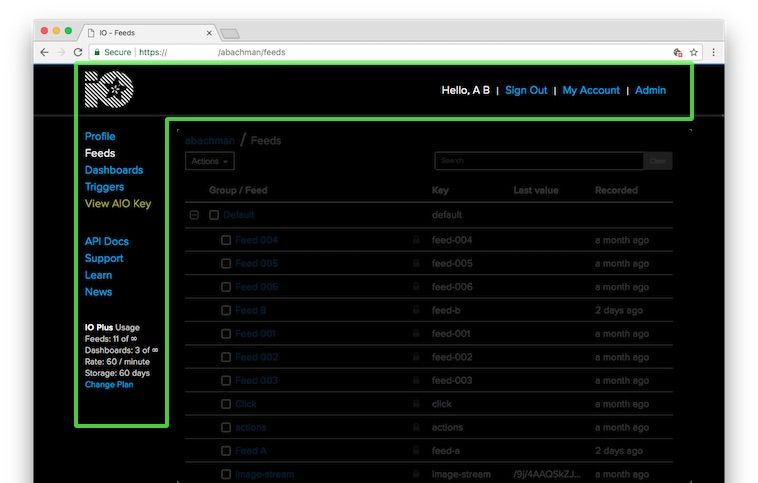
We’ve cleaned up the site navigation and made it easier to tell when you’re looking at Adafruit IO and not www.adafruit.com.
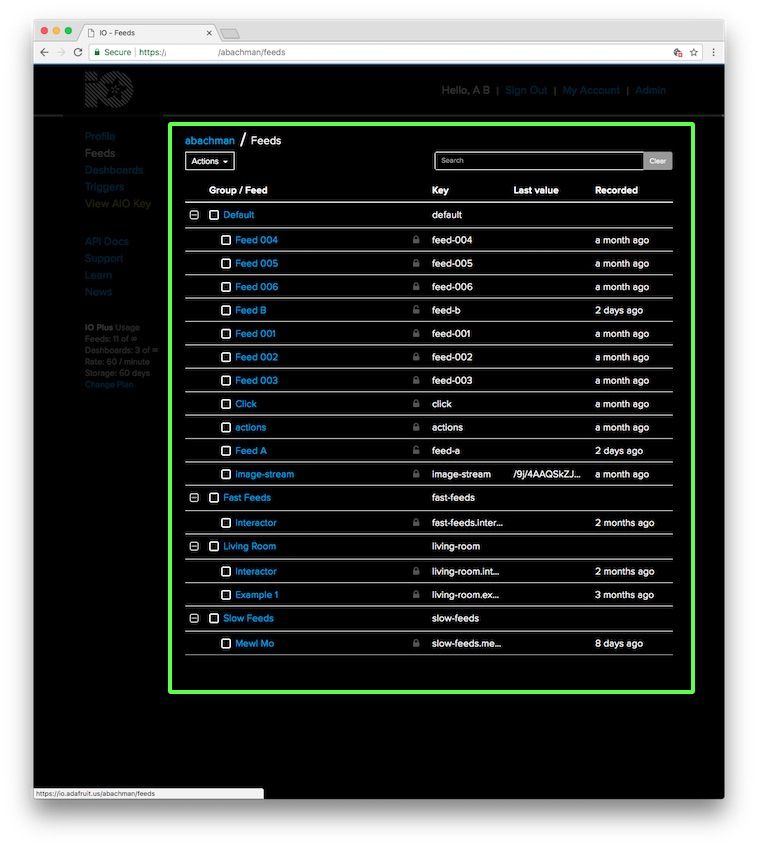
All Feeds and Groups are now on a single page. This should make it easier to see how Groups and Feeds are related, and also easier to manage them.
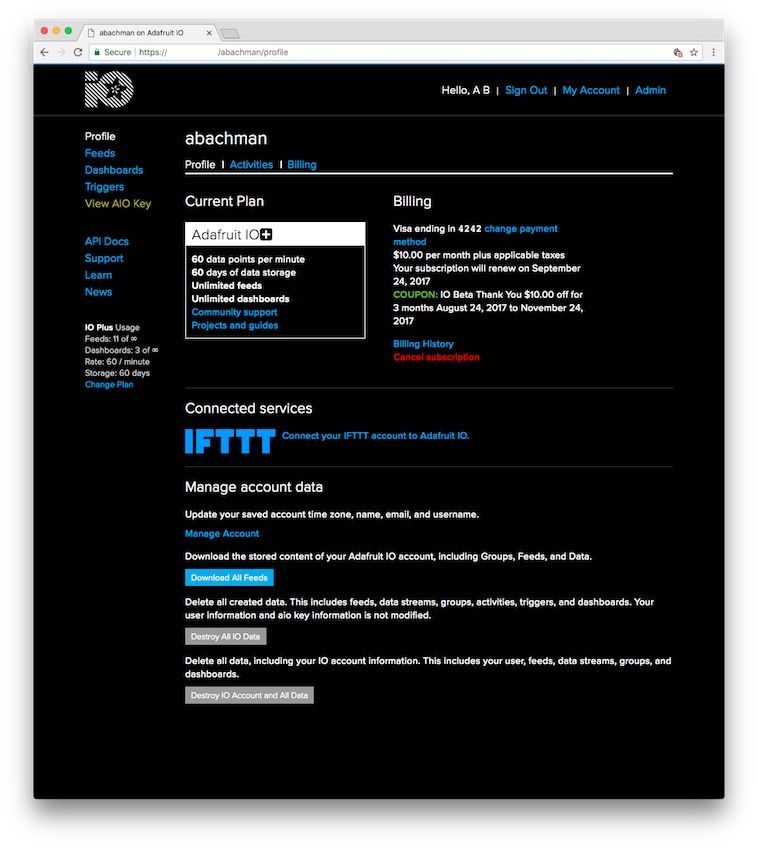
A new account profile page. This one is going to see more work in the coming months, but for now it’s the one-stop screen to see which plan you’re running and to get access to your account settings.
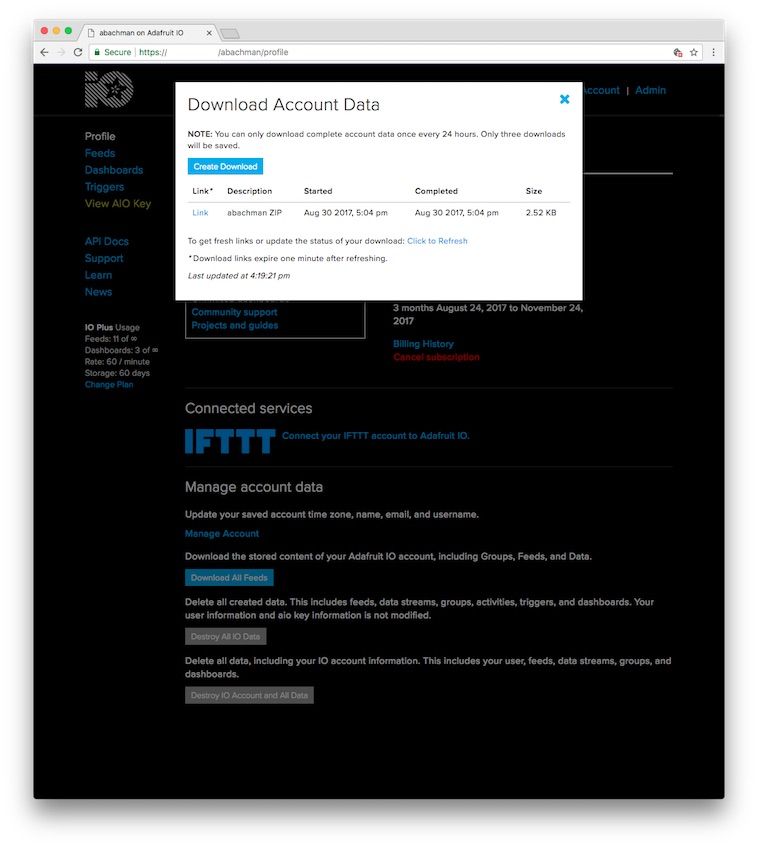
The account download feature has been rebuilt to be more robust and reliable. (this feature has already launched)
There will, of course, be design tweaks as we get closer to launch and we’re always working on the site, so small things will continue to get better.
That’s all … for now!
We’re still hard at work on IO and there’s lots more to come. If you’re already using Adafruit IO, thank you for continuing on this journey with us, and if you haven’t yet signed up, now is a great time :D
1: The “IO Beta Thank You” coupon is for any user who has had an account since before September 1, 2017 and will be applied automatically at checkout.
2: If you keep your free account after IO+ launches, we’re not going to delete your feeds, but you won’t be able to create new feeds if you already have more than 5, the IO Free plan limit. If you choose to subscribe to IO+ and then cancel, however, your feeds will be dropped back down to 5 after your subscription ends but you will have plenty of time to download all your data before that happens.
We’ll continue to clarify details as we get closer to launching and if you have any questions please stop by the forums and get in touch.
Just remember this is coming soon, we have not set a date yet 🙂
-
State of IO 08.10.17
Here are the stats for the past week:
* 81.4 million inserts of logged data in the last 7 days * 31,742 users * 27,295 online feeds (94,065 feeds total)We’re responding to issues you may run into on our Adafruit IO Forum. Please post any issues with as much detail as you can. It definitely helps us out when fixing the bugs.
Also, if you’re still using version 1 of our API, you may want to upgrade to the latest version 2. It has more features, and is generally better designed and easier to use than our previous API. The default for our docs is V2 now as well.
-
State of IO 07.19.17
Here are the stats for the past week:
* 78.9 million inserts of logged data in the last 7 days * 30,780 users * 26300 online feeds (90,680 feeds total)Since the last state of io post we’ve updated our Adafruit IO Arduino client library. We’ve added a few new features to dashboards, such as customizing buttons with colors, unified throttling with our new throttle, and many fixes behind the scenes as well as issues reported on our forums (thanks!).
We’re also responding to issues you may run into on our Adafruit IO Forum. Please post any issues with as much detail as you can. It definitely helps us out when fixing the bugs.
Also, if you’re still using version 1 of our API, you may want to upgrade to the latest version 2. It has more features, and is generally better designed and easier to use than our previous API. The default for our docs is V2 now as well.
-
Important Client Library Update
Note: The library has now been updated to 2.6.0 with this required change.
There is an important update to the Adafruit IO Arduino client library that will be released tomorrow. We will perform this update as a coordinated update with the SSL certificates for io.adafruit.com. The client library contains an SSL fingerprint that checks the validity of the connection.
You will need to download the library update, and then compile/upload to your devices once the update is released tomorrow. We will update this post once the update has been pushed.
-
State of IO 07.07.17
Here are the stats for the past week:
* 76.4 million inserts of logged data in the last 7 days * 30,188 users * 25607 online feeds (88,417 feeds total)The biggest new feature is a new download system for your data. It’s a more robust way to download your data and doesn’t make you wait for it to complete, along with a few other neat features. If you want to try it out, visit your feed or settings page to download your data.
We’ve also updated our throttling algorithm. Please see this post for more details.
Another update that we can talk about is that we are that we’re currently working on our Ruby and Python client libraries. Porting them to the api v2, and adding new features. If you want to play with alpha/beta code, feel free to check those out in their respective repository and api-v2 branches.
We’re continuing to work on a few major new features, but we aren’t quite ready to talk about them yet.
We’re also responding to issues you may run into on our Adafruit IO Forum. Please post any issues with as much detail as you can. It definitely helps us out when fixing the bugs.
Also, if you’re still using version 1 of our API, you may want to upgrade to the latest version 2. It has more features, and is generally better designed and easier to use than our previous API. The default for our docs is V2 now as well.
